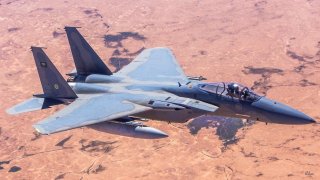The Mischaracterization of the War in Yemen
A settled conflict would be better than perpetuating this war in the mistaken notion that it is one front in a principled region-wide struggle.
The Houthis have now been for several years the de facto government of much of Yemen, covering close to half the country’s population. They are not going to slink away to the remote hills of Saada Governorate. Any proposed settlement of the conflict needs to recognize that fact.
Perhaps some sort of power-sharing is possible, but a repartition of Yemen—which has been united only since 1990—should not be ruled out. A map of current areas of control recalls the general boundary lines from when Yemen was two countries. Most of what the Houthis control corresponds to the former North Yemen.
If there were to be a new partition, neither resulting country would be especially pretty. The Houthis represent some customs and wartime practices that are repugnant to Western eyes. A new South Yemen might be even uglier. The Hadi regime shows little evidence of popular support and is largely in the pocket of Saudi Arabia. Other areas of the south are controlled by UAE-backed separatists or by the local affiliate of Al Qaeda (which the Houthis consider an archenemy). Not pretty, but a settled conflict would be better than perpetuating this war in the mistaken notion that it is one front in a principled region-wide struggle.
Paul Pillar retired in 2005 from a twenty-eight-year career in the U.S. intelligence community, in which his last position was National Intelligence Officer for the Near East and South Asia. Earlier he served in a variety of analytical and managerial positions, including as chief of analytic units at the CIA covering portions of the Near East, the Persian Gulf, and South Asia. Professor Pillar also served in the National Intelligence Council as one of the original members of its Analytic Group. He is also a Contributing Editor for this publication.
Image: Wikipedia.

